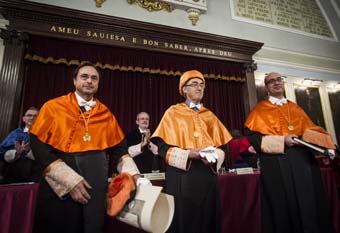
“For every debtor there is an imprudent creditor. So we need to stop playing a game of morality in the Euro Zone. The responsibilities of the disaster are shared by North and South. It takes two to a tango”. With these words, Paul de Grauwe referred to the euro crisis, this Friday. The prestigious economist was invested Doctor “Honoris Causa” by the University of Valencia.
Paul de Grauwe explained that: “there is a sizable crack between North and South in the Euro Zone. This one is not only economic: the north, relatively prosperous, that so far has not been too affected by the debt crisis, and the south (including Ireland) afflicted by problems and where the debt crisis has hit hard and has led the countries into an unstable situation, characterized by high rates of interest, budget austerity, increasing unemployment rates and economic recession”.
For the new Doctor “Honoris Causa”, parallel to this economic gap, there is a big difference in the nature of the analysis provided by economists between causes and solutions of the sovereign debt crisis. In Germany, the predominant point of view about causes and solutions has two main ingredients. First, in the diagnosis, there is the conviction that the reason of crisis lies in the waste of governments which led to an excessive deficit and debt. Secondly, on solutions the point of view of the North is that the governments should be punished in order to point out those who should not attempt to “never sin again”.
De Grauwe has rejected this point of view: “the “north diagnosis” could be applied to Greece, but not in other countries of the Euro Zone, and specially Spain”. For this specialist in European monetary union, “the insistence that governments should be punished with harsh austerity programmes has led the Euro Zone to a new recession. This will not help to reduce the budget deficit or the debt. The recessions, invariably increase government deficit and debt, and largely offset the effects of budget austerity”.
The full speech of Paul de Grauwe is available, in Catalan, Spanish and English here.
Cecilio Tamarit, Full University Professor of Applied Economics at the University of Valencia, has read the ‘laudatio’. Tamarit, citing the work of Paul de Gauwre , has said that the solution of the crisis, “will be political or will not occur at all”. And he specified: “it should be a symmetric and unite solution, which implied an adjustment of competitiveness not only in the deficit countries but also in those with a persistent surplus, and in which the European institutions play an important role to finance this adjustment process in the short term”.
In the ‘laudatio’ it can be read: “It is said, probably rightly, that economists are specialists in predicting the past. But, this is not the case of Professor Paul de Grauwe. He is one of those few great economists, able to see the problems clearly, predict its future evolution and prescribe the best recipes to avoid greater evils. When many politicians and analysts tell us that the current crisis was not predictable, those who have studied and followed the work of Paul de Grauwe, know that this is not true. Many of the elements of the current crisis existed already in the faulty construction of the institutional framework of the Union and in the lack of actions or even in the erroneous actions taken by the responsible politicians at the different levels of government”.
The 'laudatio' can be consulted here
The Principal of the University of Valencia, Esteban Morcillo, has stressed the linkage of Paul de Grauwe with the University of Valencia. “Professor of several of our teachers has visited the Faculty of Economics on different occasions, where he gave seminars and conferences in collaboration with the Jean Monnet Chair for Economic Integration of our University”.
The Principal highlighted in the message of this important economist “the conviction of the importance of knowledge, tolerance and dialogue for solving the problems of society. Suspicion, if not hostility between countries, as well as an inadequate moralistic attitude are obstacles in solving the crisis”.
Esteban Morcillo said “The University is no stranger to this situation of economic and social crisis. And its position against actions that can endanger a model of public and quality university has been expressed in agreements of the Governing Council and the University Senate. A university that has contributed to the generation of Knowledge, putting us in a good position in terms of global scientific production, the generation of economic wealth and highly qualified human resources. And above all has contributed greatly to social cohesion as is shown in the study about social and economic contribution of the public university system recently published by the Valencian Institute of Economic Research”.
The words of the Principal can be read here
Paul de Grauwe (Ukkek, Belgium, 1946) is Full University Professor at the Katholieke Universiteit Leuven, research director of the Center for Economic Studies (CESifo) of the University of Munich and member of the Center for Economic Policy Studies (CEPS). Doctor by the John Hopkins University, has taught among others in the Universities of Michigan, Brussels, Tilburg, Pennsylvania, Kiel and the College of Europe. Doctor De Grauwe has been economist of the International Monetary Fund (IMF), consultant of the Bank of Japan, of the U.S. Federal Reserve and in the European Central Bank. He was also deputy and senator of the Belgian Parliament.
Doctor “Honoris Causa” by the universities of Genoa, Sankt Gallen and the Turku School of Economics and Business Administration. He is in possession of different awards and honors, among them, the Woodrow Wilson, Prize of the European Communities and the Amex Bank Review Awards.
Specialized in open macroeconomics, Dr. De Grauwe is recognized as one of the leading specialists in the study of the process of monetary integration in Europe.
In the session were also given the extraordinary awards of Doctorate 2011-2012.
Last update: 30 de november de 2012 14:11.
News release



















